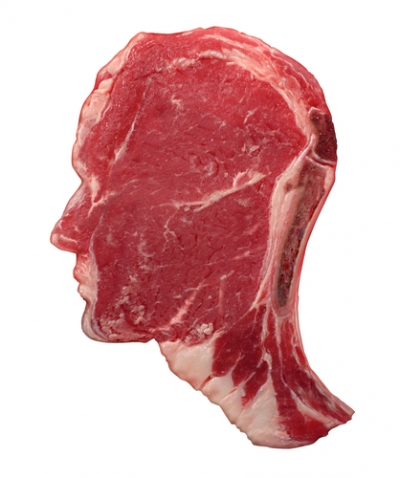Traditionally omnivores, humans are shifting towards a more carnivorous lifestyle. This change is especially apparent in countries like India and China where the rapidly changing economies are causing citizens to eat more meat.
A new study on global food consumption published in Proceedings of the National Academy of Sciences, looks in detail at what people are eating. It also studied trends for individual countries. The ones that are eating more meat are doing so in such amounts that they effectively “cancel out” any decrease in meat-eating in other countries.
The study also calculated humanity’s trophic level for the first time. The trophic level is what is used to determine a species’ position in the food chain. On the 1-5.5 scale, humans rank 2.21, putting us on the same level as other omnivores. What’s interesting scientists is that rank has gone up .06 in the last 50 years, which they say is a significant increase and shows a trend of consuming more meat-based foods.
What’s the impact of higher meat consumption? When comparing producing meat to producing vegetables, the impact on everything from carbon emissions to water use is much higher with meat production. A study from 2006 also found that the livestock industry is at least partly responsible for 18 percent of global greenhouse gas emissions.
More than 102 pounds of meat are consumed per person each year, with about 271 pounds consumed by Americans alone. That’s not counting the 30 million Americans who follow a vegetarian or vegetarian- inclined diet.
Those 30 million people, and the millions of other vegetarians around the world, may be on to something. Vegetarians consume diets that are lower in calories, saturated fat and cholesterol. Of course, the benefits only prove true when vegetarians stick to a diet that emphasizes plants, avoids processed foods and is well-balanced.
When it comes to body weight, meat-eaters seem to be disadvantaged as well. Carnivores have been shown to have the highest average body weights, vegans the lowest, and vegetarians and semi-vegetarians falling somewhere in the middle.
While the world may be shifting to a diet that contains more meat, it is good to remember the health benefits of putting more plant-based foods in your diet. Eliminating meat from your diet isn’t necessary; it provides essential iron, protein and Vitamins A, B and D. However, following a balanced diet will ensure you reap all the nutritional benefits of being an omnivore.
Also Read:
Kentucky Man’s Raw Meat Diet Sounds Insane and Dangerous
The Only Fitness Tracker Guide You Need for Holiday Shopping

